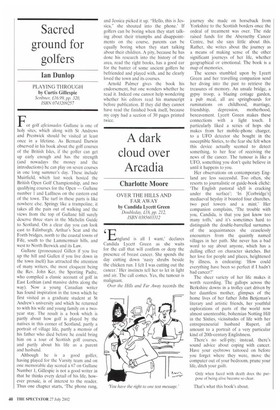A dark cloud over Arcadia
Charlotte Moore
OVER THE HILLS AND FAR AWAY by Candida Lycett Green Doubleday, £18, pp. 212, ISBN 0385603312 England is all I want,' declares Candida Lycett Green as she waits for the call that will confirm or deny the presence of breast cancer. She spends the day cutting down 'nasty shrubs beside the chicken run. I felt I was cutting out the cancer.' Her instincts tell her to let in light and air. The call comes. Yes, the tumour is malignant.
Over the Hills and Far Away records the journey she made on horseback from Yorkshire to the Scottish borders once the ordeal of treatment was over. The ride raised funds for the Abernethy Cancer Centre, but she says little about this. Rather, she writes about the journey as a means of making sense of the other significant journeys of her life, whether geographical or emotional. The book is a map of memories.
The scenes stumbled upon by Lycett Green and her travelling companion send her diving into the past to retrieve the treasures of memory. An unsafe bridge, a gypsy troop, a blazing cottage garden, a pub meal, all are springboards for ruminations on childhood, marriage, friendship, depression, motherhood, bereavement. Lycett Green makes these connections with a light touch. I particularly liked a series of hops she makes from her mobile-phone charger, to a UFO detector she bought in the susceptible Sixties, to the fear she felt when this device actually seemed to detect something, to her fear of receiving the news of the cancer. The tumour is like a UFO, something you don't quite believe in until it happens to you.
Her observations on contemporary England are less successful. Too often, she resorts to journalistic or guide-book cliché: 'The English pastoral idyll is cracking under the surface'; In [Corbridge's] mediaeval heyday it boasted four churches, two peel towers and a mint.' Her companion complains, 'The trouble with you, Candida, is that you just know too many toffs,' and it's sometimes hard to distinguish the double-barrelled surnames of the acquaintances she ceaselessly encounters from the quaintly named villages in her path. She never has a bad word to say about anyone, which has a dulling effect on character sketches. But her love for people and places, heightened by illness, is endearing: 'How could everything have been so perfect if I hadn't had cancer?'
The sheer variety of her life makes it worth recording. The gallops across the Berkshire downs in a trolley cart driven by her dauntless mother, glimpses of the home lives of her father John Betjeman's literary and artistic friends, her youthful explorations of parts of the world now almost unenterable, bohemian Notting Hill in the Sixties, vicissitudes of life with her entrepreneurial husband Rupert, all amount to a portrait of a very particular kind of 20th-century Englishness.
There's no self-pity; instead, there's sound advice about coping with cancer. Have your eyebrows tattooed on before you forget where they were, move the computer out of your bedroom, prune your life, ditch your guilt.
Only when faced with death does the purpose of being alive become so clear.
That's what this book's about.
































































 Previous page
Previous page